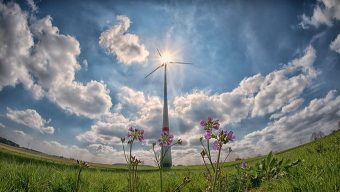
Renewables have been cheaper or equal in price to power from new coal or nuclear plants in around half of G20 countries since 2015, according to a new Greenpeace commissioned report, which predicts wind and solar power will outcompete all alternatives across the whole G20 by 2030.
The study, which was carried out by the Finnish Lappeenranta University of Technology, analyses electricity generations costs in all G20 countries from 2015 to 2030.
It found that onshore wind farms already undercut traditional power sources in large parts of Europe, South America, the US, China and Australia. It also argues that solar costs are falling so fast that the technology will undercut all other forms of power generation, including onshore wind by 2030.
The report cites growing evidence that renewables can outcompete new fossil fuel plants and nuclear projects in a growing number of countries.
“Last year, this average levelised cost of generating power from solar worldwide dropped 17 per cent, onshore wind power costs dropped 18 per cent and offshore wind power costs fell by 28 per cent according to a report commissioned by UNEP and BNEF,” the report states.
“Furthermore, in many countries RE has begun to undercut all other sources of new power generating capacity, with unsubsidised prices falling tonearly €26/MWh for a wind power project in Morocco and a bid of €24/MWh was made for a solar power plant in Abu Dhabi last year.”
Experts are increasingly confident that renewables costs are falling so fast they can still outcompete fossil fuels even when associated grid upgrade and balancing costs are considered.
The report follows a separate recent study from BNEF, which predicted renewables would provide nearly half of global power capacity by 2040 as wind and solar costs continue to fall sharply.
The analyst firm predicted solar power costs are set to fall a further 66 per cent by 2040, while onshore wind energy costs are expected to fall 47 per cent.
Greenpeace Germany energy expert Tobias Austrup said the latest study should come as a wake-up call for world leaders gathering for this weekend’s G20 Summit in Hamburg.
“There can be no excuses anymore. Climate protection increasingly makes economic sense across the G20 as renewable energy becomes cheaper than dirty coal and nuclear,” he said. “Any G20 country that is still investing in coal and nuclear power plants is wasting their money on technology that will not be competitive in coming years. The G20 now has a responsibility to send a clear signal that accelerating the clean energy transition is not only the right thing to do for the climate, but also for the economy.”
Source: businessgreen.com



